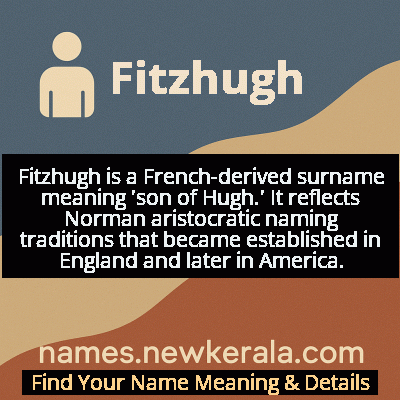Fitzhugh Name Meaning & Details
Origin, Popularity, Numerology Analysis & Name Meaning of Fitzhugh
Discover the origin, meaning, and cultural significance of the name FITZHUGH. Delve into its historical roots and explore the lasting impact it has had on communities and traditions.
Name
Fitzhugh
Gender
Male
Origin
French
Lucky Number
6
Meaning of the Name - Fitzhugh
Fitzhugh is a French-derived surname meaning 'son of Hugh.' It reflects Norman aristocratic naming traditions that became established in England and later in America.
Fitzhugh - Complete Numerology Analysis
Your Numerology Number
Based on Pythagorean Numerology System
Ruling Planet
Venus
Positive Nature
Harmonious, responsible, caring, and artistic.
Negative Traits
Overly idealistic, superficial, possessive, or jealous.
Lucky Colours
Pink, turquoise.
Lucky Days
Friday.
Lucky Stones
Diamond, turquoise.
Harmony Numbers
2, 3, 9.
Best Suited Professions
Artists, musicians, teachers, healthcare workers.
What People Like About You
Warmth, nurturing nature, artistic flair.
Famous People Named Fitzhugh
William Fitzhugh
American planter and politician
Founder of Chatham Manor and prominent Virginia colonial leader
Henry Fitzhugh
English nobleman
Notable medieval baron and royal advisor to Edward III
George Fitzhugh
American social theorist
Influential pro-slavery writer and sociologist
Fitzhugh Lee
American military officer
Confederate cavalry general and later Spanish-American War commander
Name Variations & International Equivalents
Click on blue names to explore their detailed meanings. Gray names with will be available soon.
Cultural & Historical Significance
Over centuries, Fitzhugh families became established in English counties like Bedfordshire and Northamptonshire, with branches migrating to colonial America where they played important roles in early Virginia society and politics. The name's persistence reflects the enduring influence of Norman culture on English aristocratic traditions and the transmission of these naming practices to the American colonies. In the New World, Fitzhugh families often maintained their elite status, becoming prominent landowners, politicians, and military leaders, thus preserving the name's association with leadership and social standing across continents and centuries.
Extended Personality Analysis
Individuals bearing the Fitzhugh surname are often associated with traits of leadership, tradition, and resilience, reflecting the name's aristocratic origins and historical significance. The Norman heritage suggests qualities of strategic thinking, adaptability, and a strong sense of family legacy. Many Fitzhughs throughout history have demonstrated political acumen, military leadership, and social influence, indicating potential for authoritative presence and organizational skills. The name's long history across multiple continents suggests adaptability and the ability to maintain identity while navigating different cultural contexts.
There's often an undercurrent of traditional values combined with progressive thinking, as seen in various Fitzhugh family members who balanced conservative social positions with innovative approaches to governance and society. The persistence of the name through centuries of social change indicates resilience and the capacity to evolve while maintaining core identity. Contemporary bearers of the name may exhibit a blend of old-world charm and modern practicality, often displaying strong family loyalty and appreciation for history and heritage. The name suggests someone who values continuity and tradition while being capable of leadership and decision-making in contemporary contexts.
Modern Usage & Popularity
In contemporary times, Fitzhugh remains primarily a surname rather than a given name, though it occasionally appears as a distinctive first name in families seeking to honor ancestral connections. The name maintains its aristocratic connotations and is most commonly found in the United States, particularly in Virginia and other southern states where original Fitzhugh families settled. While not among the most common surnames, it appears in professional directories and social registries, often associated with families of historical prominence. The name's usage has remained relatively stable over the past century, with occasional spikes in recognition due to notable individuals in politics, academia, or business. In recent decades, there's been a mild resurgence of interest in traditional surnames as first names, though Fitzhugh remains quite rare in this capacity, typically chosen by families with specific historical connections or those seeking a distinctive, traditional name with aristocratic flair.
Symbolic & Spiritual Meanings
Symbolically, Fitzhugh represents heritage, lineage, and the transmission of family identity across generations. The name embodies the concept of 'noblesse oblige' - the idea that privilege carries responsibility - reflecting its aristocratic origins. It symbolizes the bridge between cultures, specifically the Norman-French and English traditions, representing adaptation and cultural synthesis. The 'son of' construction speaks to themes of inheritance, both genetic and cultural, and the weight of family expectations. In a broader sense, Fitzhugh symbolizes the American experience of European aristocratic traditions being transplanted and transformed in a new world context. The name carries connotations of stability and endurance, having survived centuries of social and political change while maintaining its distinct identity and historical resonance. It represents the idea that names can serve as living connections to history, carrying forward the legacy of ancestors while adapting to contemporary circumstances.

